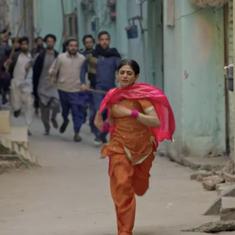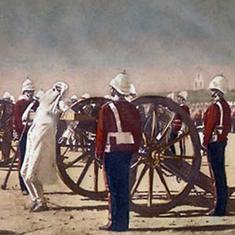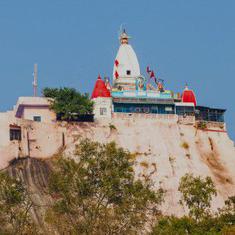In 2021, one year into the pandemic, cardiac surgeon Dr Bhabatosh Biswas found patients with pre-existing heart conditions falling ill more frequently. Some needed to be admitted to a hospital multiple times.
What also bewildered the Kolkata-based doctor was a new crop of patients – 40-year-olds and younger – who had a sudden unexplained onset of heart condition. Biswas increased medication for his existing patients and advised frequent follow-ups to the new ones.
“At first, we thought this was a coincidence,” he said.
After all, the first lockdown due to the Covid-19 pandemic had been lifted, leading to a rush of patients who wanted to consult for other ailments. “Then we slowly began to realise that Covid-19 affects system after system in the body,” Biswas said. “Including the heart.”
Biswas’s patients in Kolkata who had existing heart disease, and then suffered a severe form of Covid-19 that required critical care support, began presenting “clinical evidence of heart failure” weeks after recovering from Covid.
Young men and women who had recovered from Covid-19 reported shortness of breath and weakness as prime symptoms. “Post a Covid infection, patients have become more vulnerable and are getting more heart attacks compared to those who did not get Covid infection,” Biswas said.

Biswas’s clinical observation is hotly contested by several cardiologists in India, who attribute the rise in heart problems to a sedentary lifestyle, anxiety, and a general rise in non-communicable diseases before the pandemic.
But a growing body of international research is now steadily pointing towards a link between Sars-CoV-2 virus, that causes Covid-19, and heart disease. Several studies point to an immediate risk of heart disease following recovery from Covid-19.
Elevated heart risk
The same year Biswas noted a rise in heart patients, in mid-2021, Scotland published a nationwide study that assessed the risk of cardiac events following Covid-19 infection.
It studied 1,449 individuals who had tested positive for Covid-19. It found that the risk of myocardial infarction or heart attack, ischemic stroke or interruption in the blood supply to the brain, deep vein thrombosis in which clots form in a vein, and pulmonary embolism, the interruption of blood supply to the lung, was highest in the seven days following a Covid-19 infection.
Two years on, there is more data to support Scotland’s findings. The International Journal of Cardiology published a study by Italian doctors stating that the risk of heart attack was higher in Covid-19 recovered patients compared to the general population.
The study looked at two crore people, of whom 12.44 lakh had Covid-19 infection and were followed up for eight-and-a-half months. The study found that for every 1,000 individuals who had Covid, 3.5 suffered from myocardial infarction. In comparison, for every 1,000 individuals who did not have Covid, the figure was 2.02.
The risk, it added, was highest in the early days after infection, a theory that the Scotland research also pointed to.
Myocarditis after #COVID19 vaccination is rare. Heart problems are 5 times more likely after COVID-19 illness than after COVID-19 vaccination. Learn more: https://t.co/vB5hxYukU1. pic.twitter.com/wDJH6mufvK
— CDC (@CDCgov) February 6, 2023
How the virus affects the heart
Dr Marco Zuin, from the department of cardiology, West Vicenza Hospital, Italy, lead author of the study, told Scroll that the forensic examination of those who died from Covid-19 revealed the presence of coronavirus in the heart, which strongly suggests that the virus affects the heart.
His findings overlap to some extent with that of doctors at the All India Institute of Medical Sciences, New Delhi. Dr Randeep Guleria, former director of AIIMS, said during autopsies of Covid-19 deceased, signs of myocarditis and inflammation were found in the heart. “The post mortem was conducted on a limited number of people,” Guleria said.
Zuin said the “exact pathophysiological mechanisms” that cause heart problems immediately after Covid-19 infection or after recovery from it “have not yet been fully understood”.
But he offers possible theories.
Covid-19 patients have prolonged viral shedding, which means the body continues to shed the virus through coughing, sneezing, talking, or exhaling for days or even weeks after symptoms of infection subside.
This viral shedding creates a sort of false alarm in the body and can trigger a cascade of immune and inflammatory responses that can cause damage to the inner lining of blood vessels. This is termed endothelial dysfunction; endothelial is an inner lining in the vessel. It can lead to an increase in blood clots, medically termed as hypercoagulation.
“In infected as well as in recovered patients, a persistent hypercoagulable state may further increase the risk of coronary thrombosis,” Zuin said.
Coronary thrombosis is formation of clots in blood vessels. This can directly affect blood supply to and from the heart, and can ultimately lead to heart attack.
Another explanation Zuin offers is that Covid-19 leads to the increase in production of neutrophil extracellular traps, or NETs, which are produced by the immune system to fight invading microorganisms.
Excessive production of NETs can cause increased platelet activity which can promote blood clot formation. Blood clots can, again, lead to thrombosis, and eventually heart attack.
An Indian ophthalmologist has found similar cases of thromboembolism in post-Covid patients, a condition in which veins in the eye develop clots similar to blood vessels in the heart. “The virus seems to be affecting the endothelial cells which is leading to blood clots,” said Dr S Natarajan, founder of Aditya Jyot Eye hospital in Mumbai. “I have found such cases, and that needs attention,” Natarajan said.
A paper by John Hopkins Medicine says that Covid-19 can directly affect the heart muscles, which might affect its ability to purify blood and pump it to other organs.
Guleria too agreed that Covid-19 is known to cause “hypercoagulable state, create systemic inflammation and clotting”. But to establish a direct link with heart attacks would require cause-and-effect studies within India, Guleria said.
Dr Thambu David, head of a sub-division in the medicine unit at Christian Medical College in Vellore, said while he has not noted long-term effects of coronavirus on heart, he has seen heart-related complications during the infection stage. When the virus attacks the lung, he said, it can lead to low oxygen supply to the heart and thereby affect the heart’s functions. “Covid could also lead to rupture in plaque (fat deposits) in the artery and cause heart attack,” he said.
During the Covid-19 pandemic, several patients suffered a condition called a cytokine storm, in which the body’s immune system goes on an overdrive to kill the virus and ends up instead damaging healthy cells. “This could also damage the heart muscles. But these are not long-term effects,” David said.

Awaited: An Indian study
David argued that the Indian population has a different etiology. “None of these (Western) studies have looked at the Indian population,” he said.
He noted that the Italian paper provides a small margin of elevated heart risk between Covid-19 recovered patients and the general population. “The difference of risk is just 1.5 per 1,000 population,” he said.
David added: “It is easy to put everything into the Covid basket and blame it. My suspicion is that there is a mild increase, not a dramatic increase in heart problems.”
Doctors in India differ on what may be causing an increase in heart problems. Several argue that heart-related ailments are on a year-on-year rise and the current phenomenon is not unusual.
Dr Gulshan Rohra, cardiothoracic surgeon in Wockhardt Hospitals in Mumbai, agreed there has been a remarkable rise in patients with coronary artery disease. But he attributed it to a change in lifestyle that the Covid-19 pandemic brought with itself. “The lockdown forced people to work from home, it led to a sedentary lifestyle, increase in uptake of alcohol, and led to increased levels of stress due to job losses. All this has an impact on the heart,” he said.
Vellore clinician Dr OC Abraham has seen his critically ill Covid-19 patients develop low blood pressure, abnormal heart rhythm that led to inflammation in heart muscles and a condition called myocarditis, that can affect heart’s capability to pump blood.
But he is sceptical about the link between Covid-19 and heart attacks. “At least in my practice, I have not come across conclusive evidence to suggest that heart attacks are being caused by Covid-19,” he said.
Reading the data
To better understand if the findings of the Italian study, which suggested an immediate risk of heart attack for those recovered from Covid-19, resonate within India, Scroll accessed month-wise data of deaths from the Health Management Information System under the Ministry of Health and Family Welfare.
The ministry has stopped uploading this data after May 2021, making analysis of the second and third wave of Covid-19 infections difficult.
There were 3.12 lakh deaths due to heart diseases or hypertension in 2019-’20, which rose to 3.21 lakh in 2020-21, the year when coronavirus began spreading.
But, significantly, a more granular look at heart-related deaths in adolescents and adults showed a month-wise increase in heart-related deaths from April 2020 till September 2020, when the first wave of Covid-19 hit India. This was followed by a decline in heart-related deaths as Covid-19 cases dipped across the country.
The monthly fatality related to heart diseases again surged from April 2021, when the second Covid-19 wave hit India.
In May 2021, when cases due to Covid-19 were spiraling up, deaths due to heart diseases peaked at 52,417 fatalities that month. The trend resonates with the findings of the studies carried out in Italy and Scotland.
But several doctors Scroll contacted said the monthly fatality data may carry “noise”. It is possible some deaths, which occurred at home, were recorded as heart failure by a physician later without an autopsy to confirm it. Some deaths may have occurred due to pre-existing heart problems that could not be treated due to a lockdown. Doctors also said that in some cases, Covid-19 deaths may have been recorded as heart-related deaths due to lack of Covid diagnosis.
In India, there is no published study yet on the link between Covid-19 and heart ailments. The Indian Council of Medical Research has commissioned four studies, all underway and not yet peer reviewed.
The studies look at the link between heart attacks and Covid-19 infection, long Covid, vaccination, onset of heart problems in young adults and autopsy examination of those who died of Covid-19. Dr Nivedita Gupta, scientist at ICMR, said the study is ongoing and she could not comment on it.
Dr Ambuj Roy, professor in cardiology department at the All Indian Institute of Medical Sciences, New Delhi, who was involved in the study in the initial stage said one of the studies will look at the impact of Covid on young adults and their hearts. According to the ICMR’s director general Rajiv Bahl, the study will soon be published. Bahl did not respond to Scroll.
‘Not knowing is frustrating’
The lack of consensus can be difficult for those who suffer and seek answers. Ameya Bokil, a 31-year-old legal researcher in Bangalore, suffered from a mild form of Covid-19 when he was 29 years old. He recovered at home.
But within weeks, he began to feel his heart racing. His heart rate would shoot above 100. A normal heart rate is 60 to 100 beats per minute.
“I would be sitting at home and I would feel palpitations,” he said. A doctor’s visit found that his blood pressure was also high, something he had not complained of before the Covid-19 infection.
It has been two years since he first suffered Covid-19, and Bokil continues to be on beta blockers, a medication to control heart rhythms. He said his heart beat has worsened now but none of the doctors he has visited could provide a plausible answer to the cause.
“Not knowing is frustrating,” he said. He now routinely undergoes electrocardiogram and 2D echocardiography to check whether his heart function is normal. The fear of a heart attack lurks all the time.
This reporting was supported by a grant from the Thakur Family Foundation. Thakur Family Foundation has not exercised any editorial control over the contents of this article.










